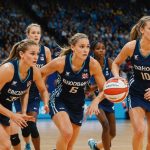Understanding Mid-Season Challenges
In the world of UK basketball, mid-season challenges are common hurdles that players face as team dynamics shift. One of the primary obstacles during this period is fatigue, which can significantly affect a player’s performance. The physical strain of continuous games and practices often leads to increased risks of injuries and can dampen motivation.
Alongside physical challenges, psychological barriers such as loss of focus and motivation dips play a crucial role. Excessive expectations and pressures during the season can lead to player struggles mentally, impacting their overall performance. Overcoming these challenges requires recognising when they occur and addressing them promptly through targeted interventions.
Have you seen this : Maximizing court awareness: unique techniques for uk basketball players to sharpen peripheral vision
Understanding the impact of competition is equally important. Players frequently grapple with heightened performance obstacles as they strive to outdo opponents. Adjusting strategies and maintaining focus helps maximize performance, despite these challenges.
Support systems, like coaches and sports psychologists, offer strategies for overcoming mid-season basketball challenges. By recognising mental strains, aiding recovery, and maintaining motivation, these experts provide essential guidance. Taking these steps ensures players manage physical and mental barriers effectively, preparing them to face the rest of the season with resilience and composure.
Also to discover : Mastering the game: proven strategies for uk basketball players to boost hand-eye coordination in shooting
Physical Training Regimens
In the realm of basketball training, physical conditioning plays a pivotal role, especially during mid-season slumps. Players need well-structured workout routines to enhance performance while avoiding burnout. A balanced regimen typically comprises strength training, endurance exercises, and agility drills. These components are tailored to improve explosive power, a critical aspect for games.
Strength training including squats and deadlifts helps develop core and leg muscles necessary for robust defence and offensive moves. Endurance workouts such as interval sprints enhance cardiovascular fitness, essential for maintaining stamina through long matches. Meanwhile, agility drills, like ladder exercises and cone drills, boost footwork and reflexes, crucial in navigating court spaces efficiently.
It’s important to adjust the training intensity and volume as the season progresses. Overload can lead to injuries, detrimentally affecting player performance. Incorporating lighter sessions with active recovery prevents excessive fatigue, ensuring athletes remain in peak condition. Coaches often tailor workouts in response to individual athletic needs and the team’s strategic goals, promoting overall performance enhancement.
Dynamic warm-ups and cool-downs are essential parts of any basketball routine. They prepare muscles for activity and aid in post-training recovery, reducing the risk of strains, and fostering sustainable growth in player skill sets.
Skill Improvement Techniques
In the competitive landscape of basketball, skill development is crucial for consistent performance enhancement. Effective basketball drills play a pivotal role in this process. Focusing on drills that enhance shooting accuracy, improve dribbling techniques, and bolster defensive skills is essential for players aiming to excel.
Shooting drills, like form shooting and spot shooting, improve precision and build confidence in various game situations. These drills help players to perfect their shooting mechanics, resulting in more consistent performance during matches.
Dribbling drills such as the figure 8 and stationary dribbling drills are key to mastering ball control. These exercises enhance players’ ability to manoeuvre quickly around opponents, maintaining possession under pressure.
Incorporating focused practice sessions and structured skill development plans ensures players remain on track. Video analysis provides valuable feedback, allowing players to identify weaknesses and refine their technique. With continuous feedback, athletes can adapt and improve progressively.
Moreover, structured skill development plans offer clear pathways for growth. Fostering a culture of regular feedback and incremental improvement, coaches can effectively guide players through the intricacies of basketball. These structured methods encourage player engagement and commitment to personal development, leading to sustained improvements on the court.
Mental Strategies for Success
Establishing a strong performance mindset is crucial for basketball players. This involves nurturing mental toughness and enhancing focus on the court. Mental resilience can be fortified through various techniques like mindfulness exercises and positive self-talk, enabling athletes to stay composed in stressful situations.
Sports psychology offers valuable tools, such as visualization and goal-setting, to sustain motivation and boost confidence. Visualization helps players mentally rehearse successful outcomes, preparing them for real-life scenarios. Setting specific, achievable goals ignites a sense of purpose, encouraging athletes to strive for peak performance during games.
To effectively manage stress and maintain a positive outlook, players can incorporate deep breathing exercises and meditation into their routines. These practices can calm nerves and sharpen concentration, allowing athletes to perform at their best. Regularly engaging in these techniques fosters a resilient mindset and prepares players to tackle challenges head-on.
Encouraging open dialogue and support within the team can significantly boost morale and mental strength. Sharing experiences and insights helps in developing a sense of community, motivating players to uplift one another. By prioritising mental strategies, basketball players can turn psychological challenges into opportunities for growth and success on the court.
Recovery Techniques and Nutrition
In basketball, player recovery and nutrition for athletes are crucial for maintaining peak performance during the mid-season. Proper recovery practices include rest days and active recovery strategies, which help players to rejuvenate both mentally and physically. Active recovery might involve light exercises like swimming or yoga to promote circulation and healing without overexertion.
Nutritional guidelines play a vital role in sustaining energy levels and aiding muscle recovery. A diet rich in proteins, carbohydrates, and healthy fats is essential for athletes. Proteins repair muscle tissues, carbohydrates provide energy, and fats support long-term energy reserves. Hydration is also critical; consuming adequate water and electrolyte-rich drinks ensures body functions remain optimal.
Implementing well-rounded wellness strategies helps players prevent injuries and handle the rigours of the season effectively. Routine management of recovery and nutrition allows athletes to thrive throughout demanding schedules.
Structured recovery plans tailored to individual needs are extremely beneficial. They ensure athletes remain resilient against fatigue and injury while optimizing performance. By incorporating these wellness strategies, athletes can achieve a healthy balance, paving the way for sustained success on the court.
Insights from Experts and Player Testimonials
Gaining wisdom from experts and insights from players can significantly aid in overcoming the mid-season basketball challenges that UK basketball players face. Recognised coaches and sports psychologists offer invaluable advice. For instance, engaging in tailored performance obstacles strategies can enable athletes to remain resilient.
Notably, experienced player testimonials reveal the importance of maintaining mental strength during intense competitions. Many athletes have noted that recognising motivational declines early – a common occurrence known as player struggles – can prevent extensive performance drops. Seasoned players share how cultivating robust support networks is key, emphasising the role of teammates and mentors.
Some coaches advocate for incorporating community-based programs, fostering a sense of unity and shared goals. This not only enhances individual performance but also solidifies team cohesion. Example case studies highlight UK players who utilised these resources to navigate their mid-season hurdles successfully.
These stories underscore the importance of the basketball community in providing emotional and tactical support, showcasing how teamwork extends beyond the court. By integrating expert advice with tangible player experiences, individuals can develop practical strategies to surpass performance barriers while promoting overall well-being and cohesion.
Additional Resources and Tools
In the modern game, training resources play a crucial role in a player’s development. Basketball apps are becoming invaluable tools for performance tracking and improvement, offering features like shooting statistics and progress tracking. These applications offer interactive drills and real-time feedback, aiding in skill refinement.
Books and videos are exceptional resources for further learning. Notable books on basketball strategies and player psychology provide insights into the mental and tactical aspects of the game. Video tutorials offer visual demonstrations of techniques, complementing hands-on practice with expert guidance.
Workshops and clinics provide practical skill-building opportunities, frequently conducted by experienced coaches. These events offer players a chance to sharpen their skills with personalised instructions and feedback. Attending such workshops often exposes athletes to cutting-edge techniques and innovative approaches to the game.
Moreover, coaching opportunities in the UK allow players to gain mentorship from seasoned professionals. Engaging with expert guidance promotes personal growth and equips players to handle mid-season basketball challenges effectively. This holistic approach to resources ensures players not only train harder but smarter, maximizing their skill set and fostering a positive environment for personal and team success.











